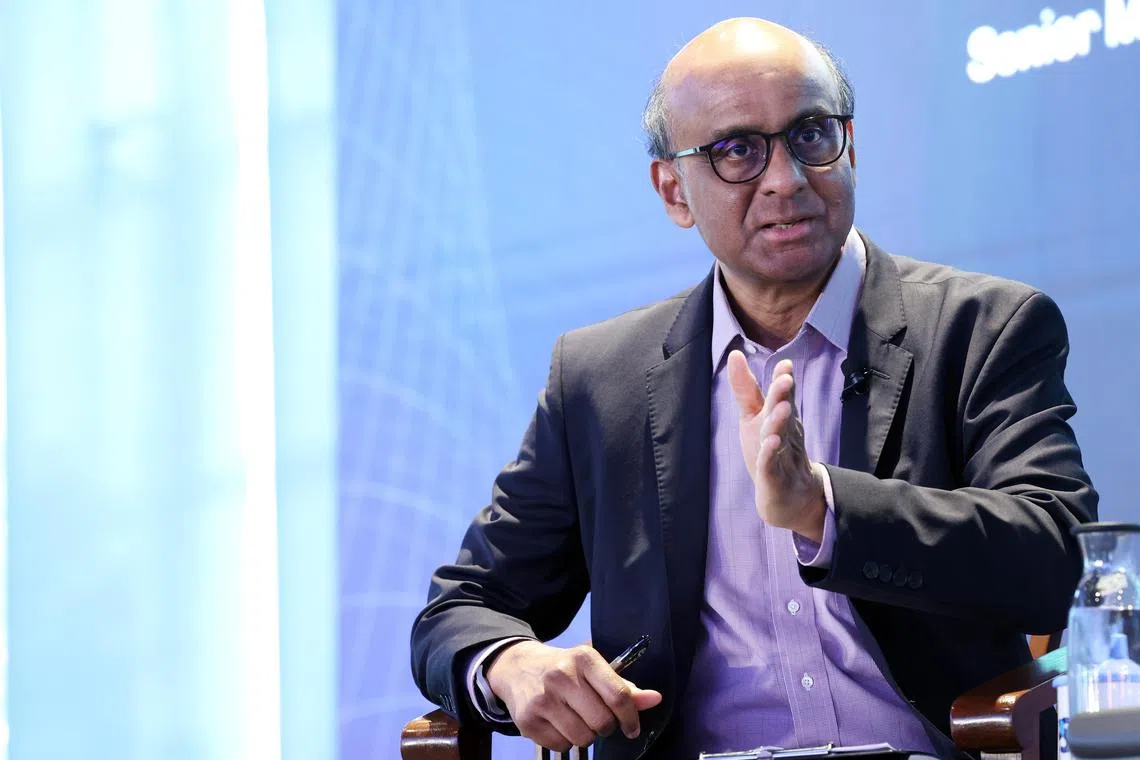$6 million fund launched to advance social causes in Singapore
Sign up now: Get ST's newsletters delivered to your inbox

Senior MInister Tharman Shanmugaratnam called for more to be done to strengthen trust among Singaporeans.
PHOTO: LIANHE ZAOBAO
SINGAPORE - A $6 million fund has been launched to support social solutions, from helping former offenders or people with disabilities to be business owners, to bringing neighbours together to brainstorm ideas for their community.
On Wednesday, the Tote Board committed the sum over three years, to partner with the Lee Kuan Yew Centre for Innovative Cities (LKYCIC) and the Institute of Policy Studies (IPS) to support such solutions that are action-oriented and evidence-based.
Half will be channelled to support the new Future-Ready Society Impact Fund, which will bring together community partners from the public and private sectors to come up with new solutions.
LKYCIC’s chair, Professor Cheong Koon Hean, said: “The multi-year collaboration will really enable us to learn by doing, because it will build upon the research, build upon the test-bedding in order to improve the interventions.”
Explaining some of the more real-world ideas in the pipeline, Dr Justin Lee, senior research fellow and head of the Policy Lab at IPS, listed an inclusive business incubator to allow groups such as former offenders and people with disabilities to run their own businesses; residents engaging in participatory budgeting to improve their communities; and forming discussion groups with people who disagree with each other to find consensus on contentious issues.
Prior to the launch of the fund, Senior Minister and Coordinating Minister for Social Policies Tharman Shanmugaratnam spoke about social cohesion at a dialogue moderated by LKYCIC Professor and Ambassador-at-Large Chan Heng Chee.
Mr Tharman called for more to be done to strengthen trust among Singaporeans, especially at the neighbourhood level.
He cited an IPS World Values Survey in 2021 which found that 22 per cent of people in Singapore did not trust others at the neighbourhood level. This was on the lower end of the spectrum when compared to the other countries surveyed, which included China, Thailand and Australia.
Yet, for trust in people in general, about 34.6 per cent of respondents in Singapore said most people can be trusted, which ranked similarly to other countries including Thailand, Japan and South Korea.
Mr Tharman said that while Singapore has been able to achieve peace nationally among people of diverse ethnicities and religions through education and public housing, more work had to be done at the neighbourhood level.
“What we’ve achieved at Singapore is something of an oddity; this peace, but also just the fact that people get along quite well together.
“But we should do even better, and that data at the neighbourhood level is suggestive of how much better we can do... starting from young all the way up,” he said to the audience of about 300 people from the social service sector at the Flower Field Hall in Gardens by the Bay.
Asked by a participant how people can normalise conversations on failure and co-create solutions for a resilient society, Mr Tharman said that nothing is actually completely lost when one fails at something, as one would develop skills in that particular area and build resilience.
“Let’s make the most of developing resilience in all its different ways. It doesn’t mean leaving people to fend entirely for themselves,” he said, adding that he was supportive of government and community schemes, and that there should be more extensive mentorship by the business community.
When asked how mutual support and collaboration can thrive in an environment where competitive values are promoted, he said: “In Singapore, we’ve overdone... the sharp edge of meritocracy.
“We’re now moving towards a broader meritocracy, where we recognise many different merits and skills and talents.
“We’re moving towards a more continuous meritocracy, where it’s not just the grades you earned early in life, but it’s that constant upgrading and ability to contribute with new skills through life that is recognised. (It’s) still a meritocratic framework, but we’re broadening it and extending it through life.”
Correction note: An earlier version of this article quoted Mr Tharman as saying “(It’s) still a meritocratic framework, but we’re bonding it and extending it through life.” He had used the word “broadening” and not “bonding”. We are sorry for the error.



